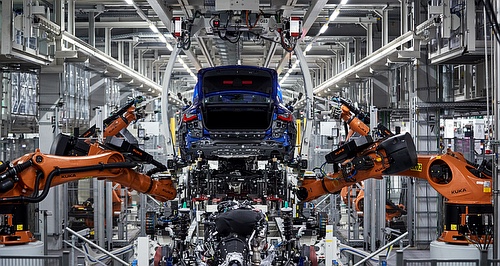Make / Model Search
News - BMWBMW lowers H2 production forecastPower and microprocessor supplies force BMW to lower its output over the next six months4 Aug 2022 GAS supplies for power generation and ongoing microprocessor shortages are the two biggest factors weighing on BMW’s business forecast over the next six months.
Other travails would be influencing company executives as the German automaker lowered its output forecast and warned of a highly volatile second half of 2022.
According to Automotive News Europe (ANE), BMW’s downbeat predictions are driven by the price/supplies of energy in Europe and microchips worldwide… the two crucial factors to their hitting full-year earnings targets.
Despite the negativity, the company expects a solid sales increase in the second half but said full-year deliveries will fall short of last year's record high of 2.52 million units.
Tightening sanctions on Russia, interruption of gas supply or the possibility of the war in Ukraine spreading were not factored into its forecast, BMW said on Wednesday.
“Semiconductor supply difficulties remain the dominant and decisive issue for our sales,” said BMW CEO Oliver Zipse.
“New incoming orders were beginning to fall but order books remain filled for the next few months.”
According to ANE’s report, BMW sees vehicle orders normalising toward the end of the year, particularly in Europe, as pent-up demand from the semiconductor shortage levels off.
However, BMW forecast on returns from car-making remain unchanged at between seven and nine per cent.
“The crucial factor will be how the supply situation develops, not just for semiconductors, but also energy supplies in Europe,” said Mr Zipse.
European Union members, including Germany, plan to adopt emergency curbs to gas use amid fears that Russia could further cut or stop altogether supplying gas to Europe. This would be in response to Western sanctions over Russia’s invasion of Ukraine.
BMW is a relatively large energy consumer burning through some 3500 gigawatt hours of energy annually in Germany and Austria, three-quarters of which comes from natural gas.
“We could replace the about 500 gigawatt hours of electricity produced per year from gas-powered combined heat and power plants by buying electricity from elsewhere,” added Mr Zipse.
“Replacing gas used in manufacturing processes would be more complex.”
According to ANE, BMW’s second-quarter earnings before interest and taxes fell 31 per cent to €3.4 billion ($A4.9b) despite growing revenue.
“Quarterly earnings were down because of last year's one-time gain of €1 billion ($A1.47b) from a partial reversal of EU antitrust fines, and €1 billion ($A1.47b) in headwinds from the Chinese unit’s consolidation,” BMW said in a statement.
BMW increased its stake in the joint venture with China’s Brilliance Auto Group to 75 per cent from 50 per cent in February after securing the necessary licence from Beijing to take majority control.
According to analyst Daniel Roeska of Bernstein Research, “BMW is the first manufacturer to signal caution on the demand front, a warning for year-end 2022 likely implies that BMW is already seeing weakening consumer demand today.”
ANE’s report cites a survey by Germany's Ifo institute that showed German carmakers business situation beginning to deteriorate in July, with order backlogs shrinking and price expectations plummeting.
Last week, BMW’s direct competitor, Mercedes-Benz raised its earnings outlook for the year after profits and revenues grew in the second quarter despite falling unit sales.  Read more25th of July 2022  VW and STMicroelectronics to address chip shortageNew semiconductor technology will ‘actively shape’ entire supply chain15th of July 2022  Bosch to manufacturer more chipsSemiconductor supplies to receive a much-needed boost from Bosch |
Click to shareBMW articlesResearch BMW Motor industry news |











Facebook Twitter Instagram